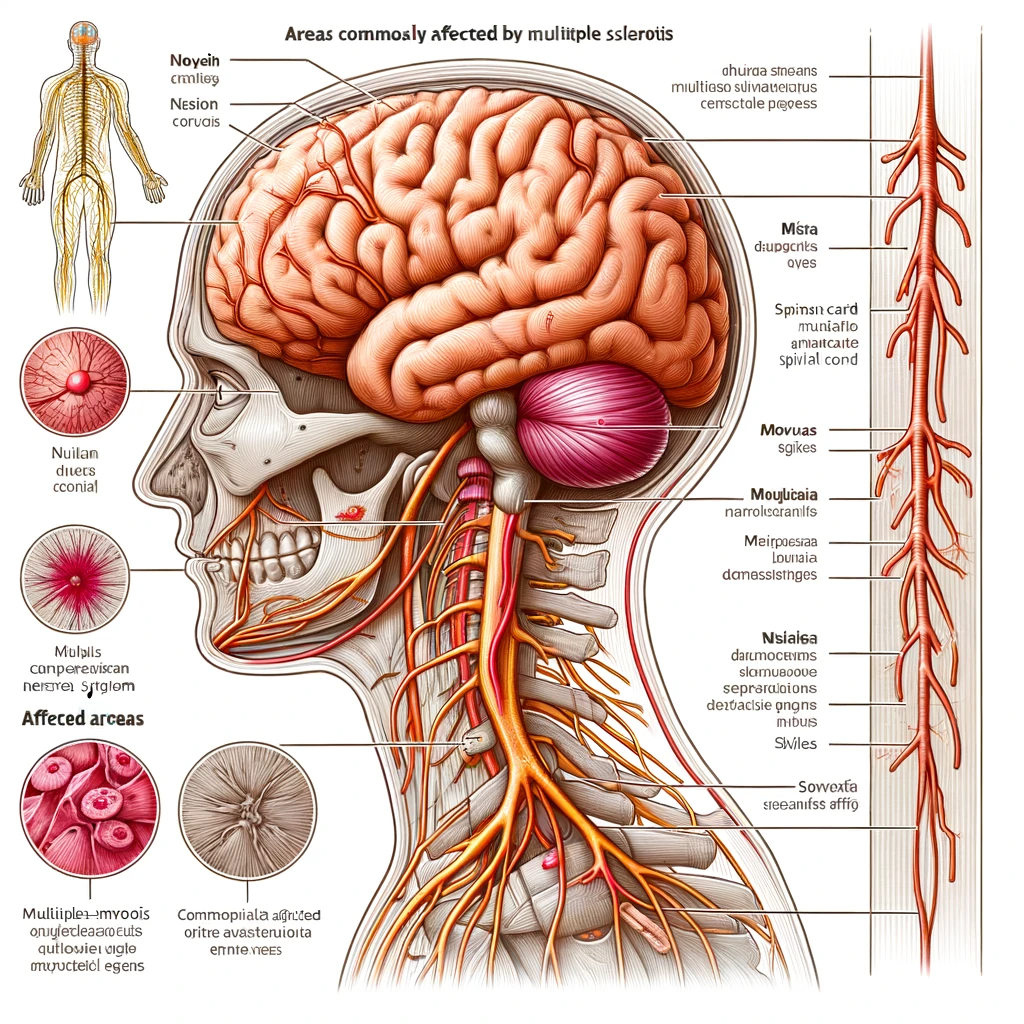Multiple Sclerosis (MS) is a condition that can silently progress, often making its presence known through subtle and sometimes confusing signs. Recognizing these early symptoms is crucial for timely diagnosis and treatment, which can significantly alter the course of the disease. In this article, we delve into the early signs of MS, aiming to raise awareness and provide valuable information for those who might be affected. Whether you’re concerned about your health, a loved one’s, or simply seeking knowledge, understanding these signs is a vital step towards proactive healthcare and management of MS.
What is Multiple Sclerosis?
Multiple Sclerosis (MS) is a chronic neurological condition that affects the central nervous system, comprising the brain and spinal cord. In people with MS, the immune system mistakenly attacks the protective sheath, called myelin, that covers nerve fibers. This causes communication problems between the brain and the rest of the body.
While the exact cause of MS is unknown, scientists believe it’s a combination of genetic and environmental factors. It’s more common in women than in men and is usually diagnosed in adults aged 20 to 40. However, it can occur at any age.
Symptoms of MS vary widely and depend on the amount of nerve damage and which nerves are affected. Some people with severe MS may lose the ability to walk independently, while others may experience long periods of remission without any new symptoms.
There’s currently no cure for MS, but treatments can help speed recovery from attacks, modify the course of the disease, and manage symptoms. Living with MS means adapting to a new lifestyle and learning how to manage the condition with the help of healthcare professionals.
Early Signs and Symptoms of Multiple Sclerosis
Recognizing the early signs and symptoms of Multiple Sclerosis (MS) is crucial for timely diagnosis and treatment. MS symptoms can vary significantly from person to person and may come and go or persist over time. Here are some common early indicators:
Vision Problems: One of the first signs of MS can be visual disturbances. This includes blurred vision, double vision, or loss of vision, usually in one eye. These issues are often due to optic neuritis, an inflammation of the optic nerve.
Numbness and Tingling: MS can cause a sensation of numbness or tingling in various body parts, including the arms, legs, and face. This occurs due to nerve damage in the brain or spinal cord.
Muscle Weakness and Spasms: Some individuals may experience muscle weakness, especially in the legs. This can lead to difficulties in walking. Muscle stiffness and involuntary muscle spasms are also common.
Balance and Coordination Issues: Dizziness and problems with coordination and balance can indicate MS. People might feel lightheaded or as if their surroundings are spinning.
Fatigue: Extreme tiredness, not relieved by rest, is one of the most common symptoms of MS. It can be debilitating and affect everyday activities.
It’s important to remember that these symptoms can also be caused by other conditions. If you experience any of these symptoms, it’s important to consult a healthcare professional for a proper diagnosis.
Less Common Early Signs
In addition to the more prevalent symptoms, Multiple Sclerosis (MS) can manifest in less obvious ways, especially in the early stages. These less common signs are often overlooked but are equally important to recognize:
Cognitive Changes: About half of the people with MS experience some form of cognitive impairment. This may include difficulties with memory, attention, processing information, or problem-solving.
Emotional Changes: MS can impact emotional health. Some individuals might experience mood swings, depression, or increased irritability. Anxiety is also not uncommon, which can be a response to both the stress of living with MS and the disease process itself.
Speech Difficulties: Some people with MS may have trouble speaking. This can manifest as slurred speech, speaking very softly, or having a hard time articulating words.
Swallowing Problems: Difficulty swallowing, medically known as dysphagia, can occur in MS. This might cause coughing or choking while eating or drinking and can lead to complications if not addressed.

It’s important to note that these symptoms can be caused by a variety of factors and do not necessarily indicate MS. However, if you experience any of these symptoms, it’s advisable to consult with a healthcare professional.
Why Early Detection is Crucial
Early detection of Multiple Sclerosis (MS) is critical for several reasons:
Slowing Disease Progression: While there is no cure for MS, early treatment can slow the disease’s progression. This can help maintain quality of life and prolong periods of remission.
Effective Symptom Management: Early intervention allows for better management of symptoms. This includes dealing with physical symptoms like muscle weakness and fatigue, as well as emotional symptoms like depression.
Preventing Complications: Early treatment can prevent or minimize complications that arise from unchecked progression of the disease, such as severe mobility issues.
Informed Lifestyle Choices: Early diagnosis enables individuals to make lifestyle choices and adjustments that can support their health and well-being, including diet, exercise, and stress management.
Planning for the Future: Knowing about the condition early helps in planning for future needs, such as career adjustments, financial planning, and family planning.
Understanding the importance of early detection can encourage individuals to seek medical advice if they experience potential symptoms of MS, leading to earlier diagnosis and better outcomes.
Diagnosing Multiple Sclerosis
Diagnosing Multiple Sclerosis (MS) can be challenging as there’s no single test for it, and symptoms can be similar to other conditions. Here’s how MS is generally diagnosed:
Medical History and Physical Exam: The process begins with your doctor reviewing your medical history and conducting a thorough physical examination.
Neurological Tests: These tests assess nerve function and look for abnormalities. This might include checking reflexes, muscle strength, muscle tone, sense of touch, and coordination.
Magnetic Resonance Imaging (MRI): An MRI is one of the most important tools in diagnosing MS. It can reveal areas of MS activity (lesions) in the brain and spinal cord.
Lumbar Puncture (Spinal Tap): This involves taking a sample of spinal fluid to look for abnormalities linked to MS. It can help rule out infections and other conditions with symptoms similar to MS.
Blood Tests: While no blood test can diagnose MS, they can rule out other conditions with similar symptoms, such as Lyme disease or certain vitamin deficiencies.
Evoked Potential Tests: These tests measure the electrical activity of the brain in response to stimuli. They are useful in detecting problems along nerve pathways.
The diagnosis of MS often requires multiple tests to rule out other conditions. It’s also based on ruling out other possible diagnoses and confirming that the symptoms are consistent with MS.
Living with Multiple Sclerosis: Initial Steps and Support

Adapting to life after a Multiple Sclerosis (MS) diagnosis can be challenging, but taking initial steps and seeking support can make a significant difference. Here are some guidelines to help manage life with MS:
Education About MS: Understanding your condition is the first step. Learn about MS, its symptoms, treatment options, and potential impact on your life. Reliable sources include healthcare providers and reputable health websites.
Regular Medical Care: Regular check-ups with your healthcare team are crucial. They can help manage your symptoms, adjust treatments, and provide guidance on living with MS.
Symptom Management: Work with your doctor to find effective ways to manage symptoms. This might include medication, physical therapy, and lifestyle changes.
Healthy Lifestyle: Adopt a healthy lifestyle that includes a balanced diet, regular exercise, and adequate rest. These can help manage symptoms and improve overall well-being.
Emotional Support: Living with MS can be emotionally challenging. Seek support from mental health professionals, support groups, friends, and family. Talking about your feelings and experiences can be very therapeutic.
Building a Support Network: Connect with others living with MS. Support groups, either in person or online, can offer valuable advice, understanding, and camaraderie.
Planning and Organization: MS can be unpredictable. Planning and organizing your daily activities can help you manage your energy and reduce stress.
Staying Informed: Stay informed about new research, treatments, and management strategies for MS. Knowledge is empowering and can help you make informed decisions about your care.
Living with MS requires adjustments, but with the right support and management strategies, many people with MS lead active, fulfilling lives.
Conclusion
Understanding the early signs of Multiple Sclerosis (MS) is essential for timely diagnosis and effective management. While MS can present a variety of challenges, early detection and treatment can significantly improve quality of life. Remember, MS symptoms vary widely; what one person experiences may be different from another. This underscores the importance of seeking medical advice if you notice any persistent symptoms. With advancements in medical research, there are now more options than ever for managing MS, from medication to lifestyle adjustments. Finally, know that a diagnosis of MS doesn’t mean giving up your dreams and aspirations. Many people with MS continue to lead rich, fulfilling lives. It’s about adapting, finding the right support, and staying informed. If you or someone you know is experiencing signs of MS, encourage them to speak with a healthcare professional. Early intervention can make a world of difference.
Call to Action
If you found this article helpful or informative, we encourage you to share your thoughts and experiences in the comments below. Your insights could provide invaluable support and understanding to others navigating similar challenges.
Don’t forget to share this post with friends, family, or anyone you believe could benefit from this information. Spreading awareness is key to helping more people recognize the signs of Multiple Sclerosis and seek timely help.
For more resources and information about MS, visit [reputable MS organizations and websites]. Staying connected and informed is crucial in managing this condition.
Remember, you’re not alone in this journey. Together, we can build a supportive community that empowers and educates those affected by Multiple Sclerosis.











